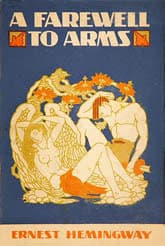A Farewell to Arms
Critique • Quotes • At the movies
 First edition, 1929
First edition, 1929First publication
1929
Literature form
Novel
Genres
Literary
Writing language
English
Author's country
United States
Length
Approx. 101,000 words
Hemingway makes love, not war
A Farewell to Arms has been called the best American novel to come out of World War I.
That could be accurate. I can think of few other American novels that are even contenders, though I can also think of several greater novels from European writers (first and foremost, All Quiet on the Western Front)—perhaps because United States was less involved in, and never devastated by, the Great War.
A Farewell to Arms is actually more of a love story than a war story. It is after all a farewell to arms. In fact, the army that the narrator protagonist deserts is the Italian forces, which Hemingway himself had served in the ambulance corps, like the protagonist (although Hemingway never deserted and in fact was awarded for bravery).
Now, calling A Farewell to Arms a romance is not to run down Ernest Hemingway, one of my favourite authors, nor to denigrate the novel that made his reputation as the leading writer of his time. War is described in Farewell with a surface detachment and attention to telling detail that brings out the underlying emotions indirectly—Hemingway at his best. The opening two-page chapter about the coming and going of troops through the landscape is often quoted as a lesson in effective writing. The scenes of a soldier's life during war are vivid.
Where love comes from
But the novel really comes to its point when Frederick Henry is wounded and meets nurse Catherine Barkley for whose love he is prepared to leave war behind.
Whenever Hemingway is accused of creating female characters who are not credible, Catherine Barkley is Exhibit A. You can counter critics that in other novels Hemingway does create memorable female characters—like Brett in The Sun Also Rises and Pilar in For Whom the Bell Tolls. But in A Farewell to Arms, why Henry falls for Catherine is a complete mystery. Their relationship seems built on nothing more than their being the leads in a novel.
Hemingway does not let us into the characters enough for us to understand their feelings and, for once, his famed understatement fails to imply greater depths. Far from a wonderful romance, it seems a trivial relationship.
I suspect that this is actually purposive on the author's part. His leading character doesn't know where love comes from. It doesn't make sense, it just feels right and it's irresistible. At one point early on, he ruminates as he is kissing his lover:
I thought she was probably a little crazy. It was all right if she was. I did not care what I was getting into.
To any outsider the relationship might appear misguided—even delusional. He cannot explain it and he doesn't care. As readers, we just have to accept that it happened. Which for many of us, of course, is not enough. Part of why we read novels is to try to understand what drives us in relationships with others. But that's not Hemingway's concern. His concern is the affect our relationships with others (in love, war, friendship) have on us.
It's similar to his view on religion. At one time Henry notes that any thinking man must be an atheist but later he indicates his desire to leave the war so the two lovers can go off somewhere to live together and serve God. Which indicates a) he doesn't consider religious belief a matter of thinking, b) he's not a thinking man, and c) whether he knows it or not, his view of serving God is probably different from that of most religious people.
Arms and the woman
In any case, Hemingway feels no need to explain or justify either his characters' love or their wider beliefs. Those feelings are just what happens when two people happen to connect. In the novel though, the romance kicks the supposed war story into another direction, into the leaving of arms, into the attempt to live the dreamt-of life, and eventually to a tragic conclusion.
The latter may be considered a leaving of a different kind of arms. I've often wondered if Hemingway had that pun in mind with the novel's title. Especially since the last chapter is so coldly powerful. "There is nothing to say" about death and loss. There is only the pain to feel, not to discuss. Yet, just stating this desolation through the robotic actions and matter-of-fact reportage of the character's thoughts—"It was like saying goodbye to a statue"—makes the feeling so much more real to readers than any amount of purple prose could.
And you can also grasp that the first-person narrator, who by this point has become indistinguishable from the author, will never again fall so easily in love, nor into the sweet dreams that lovers share. A true giving up of arms.
At the end of A Farewell to Arms the master is again at the top of his craft, forging pages of indirectly expressed anger, pain and loss that bear repeated reading.
— Eric
Critique • Quotes • At the movies

